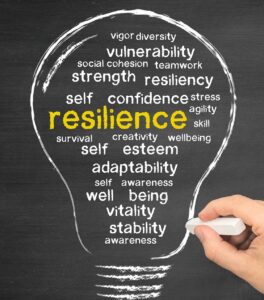
Resiliency, a term often associated with strength and endurance, holds a profound significance in the realm of mental health. In the face of life’s challenges, setbacks, and adversities, the ability to bounce back and adapt becomes a crucial factor in maintaining one’s psychological well-being. Resiliency is not merely about toughness but rather a complex interplay of emotional, cognitive, and behavioral processes that enable individuals to cope with stressors and grow stronger from them. This article explores what resiliency means from a mental health perspective and sheds light on its importance in promoting emotional well-being.
Understanding Resiliency
Resiliency can be described as an individual’s capacity to navigate through difficult experiences and maintain psychological balance despite adversity. It is not an inherent trait but rather a dynamic skill that can be cultivated and strengthened throughout life. Resilient individuals demonstrate flexibility, optimism, and an ability to develop coping strategies that aid them in recovering from setbacks.
Mental Health and Resiliency
Mental health encompasses a broad range of emotional, psychological, and social well-being aspects. While it is normal for people to face challenges and stress in life, the presence of resiliency can significantly influence how one responds to these situations. Resilient individuals are better equipped to cope with stress, adapt to changes, and experience overall emotional stability.
The Building Blocks of Resiliency
- Positive Thinking: Resilient individuals tend to maintain a positive outlook even during challenging times. They find ways to reframe negative thoughts, focusing on solutions rather than dwelling on problems.
- Social Support: Strong social connections act as a buffer against stress. Resilient people actively seek support from friends, family, or support groups, fostering a sense of belonging and security.
- Emotional Awareness: Understanding and acknowledging one’s emotions are crucial aspects of resilience. Emotionally intelligent individuals can navigate complex feelings more effectively.
- Adaptability: Resilient individuals exhibit a high degree of adaptability. They can adjust their thoughts and behaviors in response to changing circumstances.
- Problem-Solving Skills: The ability to identify problems and develop effective solutions is a core component of resilience. Resourcefulness aids in overcoming challenges.
- Self-Compassion: Resilience involves being kind to oneself during difficult times. Practicing self-compassion allows individuals to bounce back from setbacks without succumbing to self-criticism.
The Impact of Resiliency on Mental Health
- Stress Reduction: Resilient individuals are better equipped to manage stress, which reduces the risk of developing stress-related mental health issues like anxiety and depression.
- Coping with Trauma: Resiliency plays a crucial role in coping with traumatic events. While trauma can be deeply distressing, resilient individuals can recover and move forward with their lives.
- Emotional Regulation: Those with strong resiliency skills can regulate their emotions more effectively, reducing emotional reactivity and promoting emotional stability.
- Improved Well-being: Resilience fosters a positive outlook on life, contributing to an increased sense of overall well-being and life satisfaction.
Cultivating Resiliency
Resiliency is not a fixed attribute but rather a skill that can be cultivated over time. Here are some strategies to enhance resiliency:
- Cultivate a Supportive Network: Surround yourself with positive and understanding individuals who can provide emotional support during challenging times.
- Develop Coping Strategies: Learn and practice healthy coping mechanisms such as mindfulness, meditation, or engaging in hobbies to reduce stress.
- Challenge Negative Thinking: Work on identifying and challenging negative thought patterns. Replace them with more balanced and positive perspectives.
- Seek Professional Help: If facing overwhelming challenges or mental health difficulties, do not hesitate to seek support from mental health professionals who can guide you through the process.
Resiliency is a powerful concept that significantly influences mental health and emotional well-being. By cultivating the building blocks of resilience, individuals can navigate life’s challenges more effectively, adapt to changes, and maintain psychological balance. The journey towards developing resiliency may not be easy, but the rewards it offers in terms of mental strength and overall well-being make it undoubtedly worthwhile. Remember, resiliency is a journey of growth, and every step taken brings us closer to a healthier and happier life.

